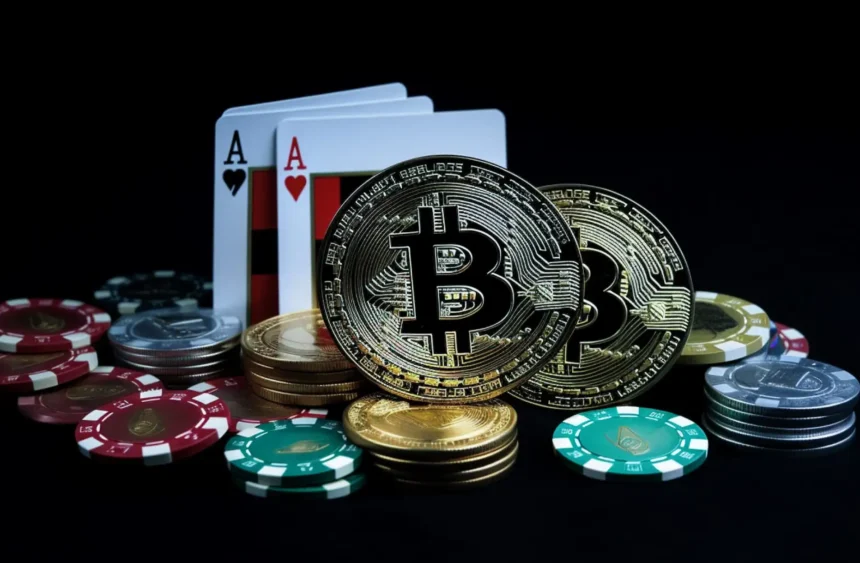The worldwide online gaming industry is going through a big change in 2025 because more and more people are using bitcoin and blockchain technologies. More and more gamers are using Bitcoin and other digital assets like Ethereum, Litecoin, Dogecoin, and USDT as their main forms of payment because they want faster transactions, better privacy, and experiences that aren’t controlled by a single company. While traditional online casinos struggle with outdated payment systems and regulatory issues, crypto taxes have raced ahead, creating new gaming experiences that meet the needs of a digitally native audience.
Evolution of Bitcoin Casino Gaming
The term “Bitcoin Casinos ” Once referred to niche platforms catering to early adopters, often operating on the fringes of the online gambling ecosystem. Today, these platforms represent a full-blown movement within the iGaming industry, characterized by transparent operations, smart contract-driven fairness mechanisms, and a player-first philosophy. In 2025, the best crypto casinos are not just gambling websites but complex ecosystems incorporating Web3 features, decentralized finance tools, and gamified user reward systems.
 Blockchain’s immutable ledger technology has redefined trust in online gaming. Traditional platforms require players to take fairness on faith. While crypto casinos can mathematically prove that every dice roll. Card shuffle. Or slot spin is fair and untampered. This concept. Known as provably fair gaming Is now a staple feature on the leading platforms. Through cryptographic hash functions and open-source algorithms. Users can verify the randomness and fairness of outcomes independently.
Blockchain’s immutable ledger technology has redefined trust in online gaming. Traditional platforms require players to take fairness on faith. While crypto casinos can mathematically prove that every dice roll. Card shuffle. Or slot spin is fair and untampered. This concept. Known as provably fair gaming Is now a staple feature on the leading platforms. Through cryptographic hash functions and open-source algorithms. Users can verify the randomness and fairness of outcomes independently.
Global Appeal of Bitcoin Casinos
The global appeal of Bitcoin gambling rests on several pillars. First, crypto transactions are near-instant and cost-efficient. Bypassing the delays and fees associated with banks. Credit card processors. Or e-wallets. Players from regions with restrictive financial systems or gambling bans find in Bitcoin casinos a way to access games without the need for invasive verification procedures or government oversight.
Another major draw is anonymity. While regulated platforms are increasingly incorporating know-your-customer (KYC) requirements. Many crypto casinos still allow players to register and play without submitting sensitive personal information. A simple wallet connection using tools like MetaMask. Trust Wallet. Or Phantom is often all that’s needed to begin playing. Thus aligning with the ethos of self-sovereignty and digital autonomy. Beyond payments and privacy. The breadth of games available at top crypto casinos is astounding. From traditional casino staples such as blackjack. Roulette. And baccarat to cutting-edge blockchain games like crash. Plinko. And coin flip. Players have more options than ever. Many of these games are developed in partnership with industry leaders like Evolution Gaming, Pragmatic Play. And Betsoft. Ensuring top-tier design. Interactivity. And return-to-player (RTP) rates.
What Sets Top Crypto Casinos Apart
In a competitive field, only a few platforms consistently earn the trust of the global crypto gaming community. Factors such as licensing, game variety. User interface. Customer support. Payout reliability. And community engagement play critical roles in determining a casino’s reputation.
Licensed platforms, particularly those regulated by the Curaçao eGaming Authority or the Malta Gaming Authority, offer a more secure and legally compliant gaming environment. These casinos are subject to external audits, responsible gaming standards. And transparent operational procedures. While the decentralized nature of cryptocurrency allows many unregulated platforms to flourish. The top-tier casinos often voluntarily comply with regulatory norms to instill user confidence. The best casinos also go beyond traditional loyalty programs. Players are often rewarded in native tokens that can be staked. Traded. Or used to unlock higher-tier VIP benefits. These gamified loyalty systems resemble DeFi projects more than traditional casino programs and are an essential driver of user retention and engagement.
Decentralized Casinos and NFT Integration
The rise of decentralized casinos is a big trend in 2025. These platforms are designed purely on blockchain and don’t need central authorities to work. Smart contracts decide how games end, how incentives are given out, and how money is managed. Users can directly interact with the protocol through their wallets. Decentralized autonomous organizations (DAOs) commonly make choices about things like fees, treasury distributions, and upgrades to the roadmap.
 Also, more and more crypto casinos are using NFTs. Some casinos now include NFT-based avatars or membership credentials that give you staking multipliers, lower house edges, or access to games that only you can play. Others make NFT slot machines, where each NFT stands for a different gaming experience with its own odds and payouts.
Also, more and more crypto casinos are using NFTs. Some casinos now include NFT-based avatars or membership credentials that give you staking multipliers, lower house edges, or access to games that only you can play. Others make NFT slot machines, where each NFT stands for a different gaming experience with its own odds and payouts.
Final thoughts
While the rise of crypto casinos brings innovation and access, it also presents challenges. Regulatory frameworks vary widely across jurisdictions, with some countries embracing crypto gambling and others banning it outright. Players must understand their local laws and ensure they are accessing platforms legally.
There is also the risk of unlicensed or rogue casinos that exploit the anonymity of blockchain. These platforms may lack transparency, manipulate game outcomes, or delay withdrawals. Due diligence, community reviews, and third-party audits are essential tools for players to distinguish legitimate platforms from scams.
Reputable casinos often publish detailed whitepapers, conduct security audits through firms like CertiK or Hacken, and maintain insurance reserves to cover user funds. They also provide detailed disclosures about tokenomics, payout structures, and transaction policies.










